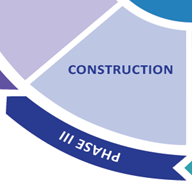Phase III - Construction
Phase III - Construction
During a project’s development, the Project Manager (PM) is the responsible administering authority. When a project gets to the construction phase, the Resident Engineer (RE) and the Construction District are the administering authorities for the project. They are responsible for successfully building and accepting the project, and for making any necessary changes to the plans or Special Provisions on behalf of the Department (see Std. Spec 104.02). Preparing a clearly defined scope, reasonable schedule and realistic budget are key contributions a PM can make to help ensure success during construction.
It’s impossible to identify all unknown issues you may encounter during construction. Unforeseen issues are just that, unforeseen. However, there are opportunities to equip the construction team with resources to address unknowns and minimize the risk for claims against ADOT. Identify what you know and what you don’t know; plan accordingly to mitigate risk. Ask yourself who is responsible for what, by when, why, and what’s the cost/risk?
As in development contracts and design projects, a clearly defined scope of work is key to keeping the team engaged and informed of upcoming activities to be completed. A clearly defined scope helps create accountability within the team. The scope of work for a contractor is identified by three primary components; Project Plans and Details, Special Provisions and the Bid-schedule / bid-items.
Many factors have potential to affect the project schedule, making sure these factors are accounted for during development will provide ample time for the field office and contractor to coordinate and avoid time extensions. Do your Special Provisions require submittals from the contractor requiring coordination during construction? Who is responsible for the review and approval of these documents? What is the expected turnaround time? Are there any on-site meetings required to build consensus?
Calendar-Days vs. Working-Days (See Construction Bulletin 14-02). Are there seasonal limitations, public concerns, economic impacts, environmental concerns, weather requirements for type of work, material availability concerns, temperature restrictions, holidays, local events, etc.
Have all construction work items been accounted for? Are the unknowns quantified? Do administration costs accurately reflect the amount of work specified by the development team? Are there special requirements / work items needing attention by the design team during construction? What are the MAJOR items of the project?
A PM can utilize the FAST program to monitor construction progress. This software is used by the construction team to administer and track the project, schedule and budget information; it also archives historical records of construction projects administered by ADOT.

PM Actions, Tasks and Deliverables
- Verify /Concurrence with District
- Contract time
- CE budget
- PDS budget
- Project Handoff Meeting
- Clearances (Environmental, Material, Right-of-Way, Utility and Rail)
- Special Notes for construction administration
- Quality Takeoffs - Including earthwork information (borrow vs waste)
